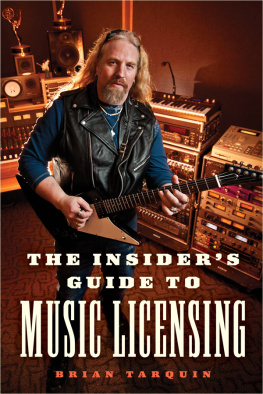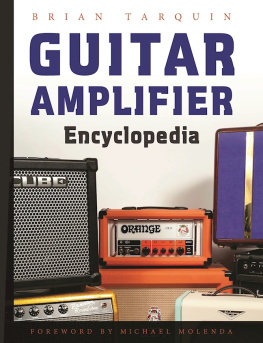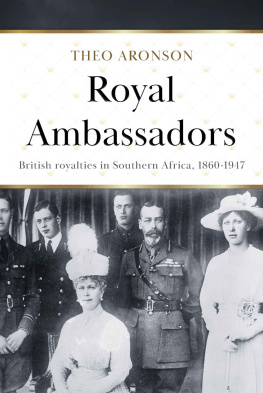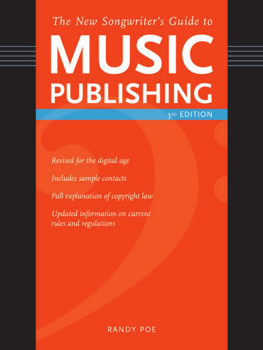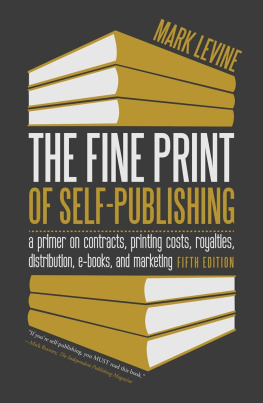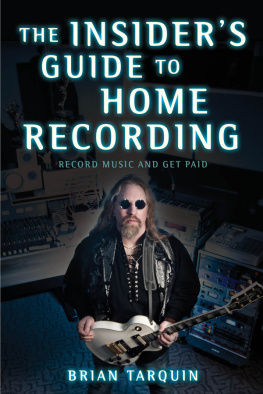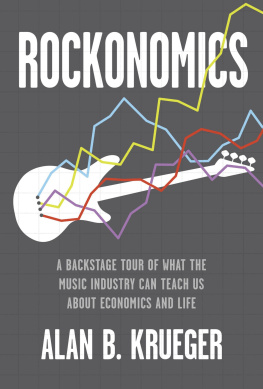

Copyright 2014 by Brian Tarquin
All Rights Reserved. Copyright under Berne Copyright Convention, Universal Copyright Convention, and Pan American Copyright Convention. No part of this book may be reproduced, stored in a retrieval system, or transmitted in any form, or by any means, electronic, mechanical, photocopying, recording or otherwise, without the express written consent of the publisher, except in the case of brief excerpts in critical reviews or articles. All inquiries should be addressed to Allworth Press, 307 West 36th Street, 11th Floor, New York, NY 10018.
Allworth Press books may be purchased in bulk at special discounts for sales promotion, corporate gifts, fund-raising, or educational purposes. Special editions can also be created to specifications. For details, contact the Special Sales Department, Allworth Press, 307 West 36th Street, 11th Floor, New York, NY 10018 or .
17 16 15 14 13 5 4 3 2 1
Published by Allworth Press, an imprint of Skyhorse Publishing, Inc.
307 West 36 th Street, 11 th Floor, New York, NY 10018.
Allworth Press is a registered trademark of Skyhorse Publishing, Inc., a Delaware corporation.
www.allworth.com
Cover design by Mary Belibasakis
Library of Congress Cataloging-in-Publication Data is available on file.
ISBN: 978-1-62153-396-2
Printed in the United States of America
Table of Contents
Foreword
by Ben McLane, Esq.
The book you are holding in your hands is a must read for anyone that is working inor is considering breaking intothe music business, because it explains a surefire method to get paid from music. Despite all the so-called doom and gloom associated with free downloads, paltry streaming royalties, and empty venues, the demand for music in film, TV, commercials, the Internet, radio, and other forms of media is increasing daily and globally. In TV alone there are countless channels clamoring for content, and the number of cues contained in one reality show episode can be numerous. This is great news for music creators/rights holders (both the song and master copyrights), because that means cold hard cash is being paid to the music creators/rights holders for providing the music that drive these shows. Monies can be earned either on the front-end, the back-end from performance, or often from both. Moreover, there are really no barriers to licensing music. The door is open to all ages, creeds and colors. In the licensing worldunlike the Top 40 gameall anyone really cares about is the music; not how old someone is, what they look like, where they live, who their father is, or how many friends they have on Facebook. The link between the music creator/rights holder, the media outlet, and the compensation, is known as a license. The basic purpose of this book is to untangle all the moving parts and teach the reader how to make it all work for them. Numerous helpful tips on maneuvering the music licensing universe and its players are sprinkled within, and well-worth applying to ones career.
Over the last twenty years, the author, Brian Tarquin, has lived, breathed and battled his way to become one of the top composers, producers, artists and executives in the entertainment businessand he has emerged as an expert on licensing along the way by really getting his hands dirty and doing it bottom-to-top (from indie films to major network shows on MTV, CBS, ABC, and NBC). Doing it so successfully in fact, he has won three Emmy Awards and charted Top 20 in Billboard magazine in the process, and he has had the honor of being involved in projects that included such musical legends as Santana, Eric Clapton, Jeff Beck, BB King, Stevie Ray Vaughn, Stanley Clarke, Jimi Hendrix, Bob Marley, Steve Vai, Tommy Bolin, and ZZ Top. As a composer, artist, and music library owner, Brian has seen all sides, and his unique perspective has allowed him to master the art of the music licensing deal. Therefore, not only does his book interpret in plain English what music licensing really means and how to profit, it also debunks the most common mysteries, myths, and rumors associated with licensing. Simply put, the reader is getting the real skinny from someone who intimately knows the process, inside and out, and who, as an artist himself, actually cares about making it really work for the creatorso that person can benefit and thrive. Better yet, as a bonus Brian has included incisive interviews with several of the most important and experienced executives that operate in the area of licensing (i.e., music supervisors, composers, and many others). The reader will gain invaluable knowledge from the advice offered by the folks found within these pages. Hundreds of years of combined experience are presented here in an easy-to-digest form. All real insider stuff.
On a personal note, I have worked for and with Brian as his music lawyer for many years and have seen firsthand the dedication and professionalism he applies to the creation of his art, how he markets it, how he protects his interests, and how he respects all the participants that make the wheel go round. In addition, Brian has mastered the art of adapting to new media/technologysuch as digital formats/platformsand staying current with the trends, all the while maintaining mutual respect with the key decision makers. He is a model of how to persevere, adapt, and make it in the music business. His numerous awards speak for themselves, and his relationships with name artists and marquee, show-music supervisors are second to none.
Bottom line, Brian Tarquin has made a great living and raised his family from licensingnow you can too. Read on and find out how.
Ben McLane, Esq.
Entertainment Attorney
www.benmclane.com
Chapter 1
Introduction to Music LicensingThe Basics
The age-old question always seems to be, How do I get my song placed on a TV show? As you can guess, it is certainly not as easy as it looks. There is a lot of legwork, phone calls, research, and of course that certain right timing factor.
Just because a show played a dance vocal song in a scene, does not mean that your dance vocal song will be played on the same show the following week. This might have been a rare situation that called for that particular style and may not be a reoccurring style in the next upcoming episodes. There are so many factors involved with music licensing, most importantly, building your relationships with music supervisors, editors, and television music licensing departments.
When I started in the late 80s it was much more of an open field for licensing music to TV and film, whereas, today, it is a lot more competitive out there on the street. The proverbial best kept secret on actually making income on your music isnt a secret anymore. Hence, through the years Ive seen both sync and master fees (sync refers to the publishing side of a song, and master means the actual audio recording of a song) and the amount that PROs (Performance Royalty Organizations), like SESAC, ASCAP, and BMI, pay, go down.
As more people get into the game, the pot remains the same, so obviously with more people the supply is greater. In turn, license fees become smaller, as do performance royalties, which is good for the shows licensing the music because it makes the fees cheaper. Then there are your newcomers on the scene that offer their music for free, no sync and master fees, which can be very bad for the rest of us. As the old saying goes, Why buy the cow, when you can get the milk for free? Well this can easily pertain to many business models that people are using today, just out of sheer ignorance.
Next page
